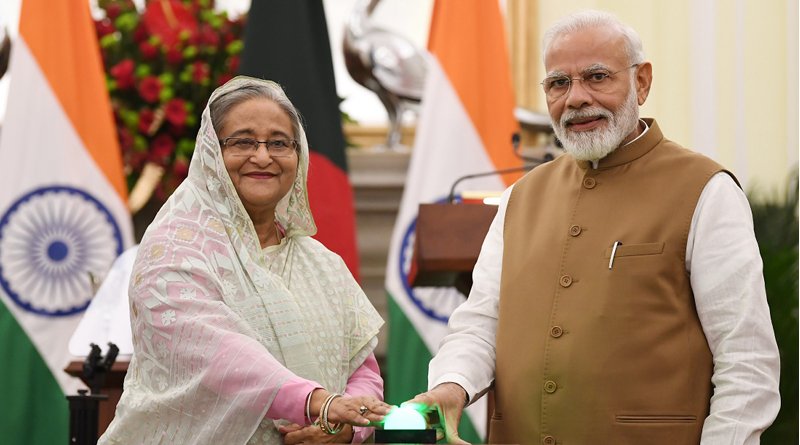It’s In India’s National Interest For Bangladesh’s Awami League To Again Form Government – OpEd
America’s muscle-flexing ahead of parliamentary polls in Bangladesh manifested, in the State Department’s open declaration that it would deny visas to persons obstructing free and fair elections, undermining democracy, or violating human rights, is really bad news for India.
Washington’s intention is crystal clear. It has put Prime Minister Sheikh Hasina’s Awami League government on a tight leash to dissuade it from resorting to so called undemocratic, illegal, and extra-constitutional methods to win the upcoming general elections like the previous elections in 2014 and 2018. But New Delhi, in contrast, wants Hasina to win by any means.
On the one hand, the US has such grave misgivings about Hasina that it wants to evict her from power. And on the other hand, the biggest priority of India’s foreign policy-security establishment is to get Hasina re-elected in January 2024 for a fourth successive term at any cost.
The gaping chasm underlines the India-US conflict over Bangladesh and raises valid questions about India’s capabilities to pursue its goal of defying the US – and whether it is wise to do so. It also flags gross US insensitivity to India’s interests even in India’s own backyard and how the US always expects India to quietly sacrifice its interests for America if they happen to clash!
In this regard, we can draw an example from SNM Abdi’s view who is a distinguished journalist and ex-Deputy Editor of Outlook. He wrote and published an article titled ‘India’s Stakes at Risk as the US Armtwists Bangladesh Over Election’ on the ‘Quint’ online journal on June 06, 2023. In his article he said that India’s national interests demand that the Awami League forms the government yet again. It is 100% true.
India’s National Interests
India’s national interests demand that the Awami League forms the government yet again so that its needs and requirements in Bangladesh are met without even having to ask. For India, there is no alternative to Hasina – New Delhi’s tried and tested ally. But the US is neither in Hasina’s nor Awami League’s favour – it is in favour of an outright regime change, no less.
There is no doubt that Washington’s sudden assertiveness has thrown a spanner in New Delhi’s works. It has jolted the Ministry of External Affairs, the Research and Analysis Wing, the National Security Coordination Secretariat, and even the Prime Minister’s Office. It has certainly made Foreign Minister S. Jaishankar’s and National Security Advisor Ajit Doval’s life a little difficult and increased their workload.
And it’s hardly a secret that more US measures are in the offing to rein in Bangladesh and tie down Hasina before the January 2024 elections, adding to India’s concerns and worries.
India’s Image as South Asia’s Superpower
Importantly, US intervention has come as a shot in the arm for the beleaguered Bangladesh Nationalist Party Which New Delhi abhors for its anti-India policies in collusion with Pakistan when it was last in power from 2001 to 2006 during Begum Khaleda Zia’s prime ministership. In that period, Islamabad had outsourced to Dhaka the job of exporting terror and subversion to India.
Any such outcome — unimaginable until the Biden Administration doubled down on the Hasina regime in end-May with ominous visa curbs — will come as a big blow to India in its immediate neighbourhood and dent its image as South Asia’s superpower.
Moreover, US pressure tactics will inevitably drive Bangladesh further into China’s arms for comfort which will be naturally very discomforting for the Narendra Modi government, especially as India’s relations with China are currently at their worst since 1962 when they fought a war.
Other Repercussions of US Intervention
Moreover, US pressure tactics will inevitably drive Bangladesh further into China’s arms for comfort which will be naturally very discomforting for the Narendra Modi government, especially as India’s relations with China are currently at their worst since 1962 when they fought a war.
US intervention can have other repercussions too. Any rise in Beijing’s clout in Dhaka is bound to reinvigorate Islamabad’s influence over Islamist and Jihadi forces in Bangladesh to the detriment of India’s national security. If the ISI gains elbow room in Dhaka under the Chinese umbrella, it is bound to take advantage of the turmoil in India’s northeast. Unless Hindu-Christian fires burning in Manipur are not extinguished quickly, the state will turn into a magnet for agents provocateurs.
However, India’s national interest demand should be that the Awami League forms the government yet again.
Ajanta Acharya PhD is a senior researcher at South Asian Geopolitics in Savitribai Phule Pune University, Pune, India.

